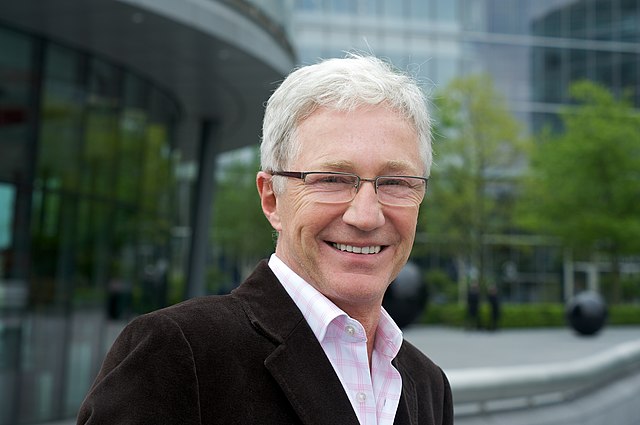
Social Work Recap is a weekly series where we present key news, events, conversations, tweets and campaigns around social work from the preceding week.
From Paul O’Grady’s death and a documentary about the treatment of austistic people in psychiatric wards to the rising food insecurity experienced by social care workers, here’s this week’s line-up:
Former social care worker and presenter Paul O’Grady dies at 67

Photo by Steve Punter/WikiCommons
Beloved comedian and drag pioneer Paul O’Grady has died at the age of 67.
O’Grady may have risen to fame with his groundbreaking drag queen persona, Lily Savage, but, before that, he was also part of the social work sector.
In the 1970s, he worked as a peripatetic care officer for Camden council while, on his days off, he perfected his act as Lily at the LGBTQ venue, the Black Cap.
“We are very sad to hear that Paul O’Grady has passed away,” said a Camden council spokesperson.
“He was a campaigner for LGBTQ equality, for the fight against HIV and AIDS and for LGBTQ nightlife and community venues. We are proud that Paul O’Grady is part of Camden’s history and of the legacy that he leaves.”
Almost 3,000 children were strip searched from 2018-22

Photo by Brian Jackson/ AdobeStock
Children as young as eight are being strip searched by the police, a report by the Children’s Commissioner for England has found.
The report unearthed 2,847 strip searches of children aged between eight and 17 that took place in England and Wales between 2018 and mid-2022.
Of those, half resulted in no further action and 52% took place without an appropriate adult present, which is required by law other than in exceptional circumstances.
The research was conducted following the case of Child Q, a black schoolgirl from East London who had been subjected to a strip search while on her period after being accused of carrying cannabis.
Commissioner Rachel De Souza said she feared this was “not an isolated problem, limited to London”, with black children disproportionately represented in the findings. They experienced 38% of strip searches and were over six times more likely to be subjected to one than their share of the national population.
The commissioner also expressed “deep concerns about the poor quality of record-keeping” with locations recorded only in 45% of cases. This risked hindering “transparency and scrutiny”, de Souza added.
You can read more about the findings and the commissioner’s recommendations here.
Scholarships for care-experienced people

Photo by BillionPhotos.com/ AdobeStock
The Open University, in conjunction with the John Lewis Partnership, has launched its first scholarship for care-experienced people.
The programme, which is now accepting applications for the 2023-24 academic year, offers four full undergraduate scholarships, involving free tuition, to care-experienced people aged 25 and under.
To be eligible you need to be a UK resident, hold no existing higher education qualifications, have proof of your time in care and be starting your studies with the Open University in 2023-24.
Applicants will also need to earn less than £25,000 a year or be recipients of certain benefits.
You can find more information here.
More than a quarter of social care worker households experience food insecurity

Photo by Антоний/ AdobeStock
Food insecurity was experienced by 27.9% of social worker households as of January 2023, according to a food charity.
A report by the Food Foundation last week found that a quarter of households in which NHS or social care workers lived struggled to access enough food, compared with 17.8% of other households.
The charity’s executive director, Anna Taylor, said this showed that food insecurity was “by no means confined to those out of work” and that the government should “scrutinise why their policies are failing to protect struggling families from affording the basics”.
“Many people doing important jobs are also suffering the stress and indignity of not knowing if their pay cheque will allow them to buy the bare essentials,” she added.
Dissatisfaction about social care services skyrockets

Photo: Andrey Popov/Adobe Stock
More than half of those who have used or had contact with social care services last year were left dissatisfied, a report has found.
The analysis of the latest British Social Attitudes survey by think-tanks the King’s Fund and Nuffield Trust found that dissatisfaction with services had risen from 37% to 57% from 2019 to 2022.
The top reason for this dissatisfaction was people not receiving “all the social care they need” (64% of those who were dissatisfied) followed by pay, working conditions and training of social care staff being bad (57%) and there being a lack of support for unpaid carers (49%).
Andrew Dilnot, the economist behind the government’s now-delayed plan to cap social care costs, told the Observer that the findings showed “how miserable we’re making the lives of people who need care” and that they were “something we should be ashamed of”.
“Compared with our health service or our education system, the amounts of money involved in social care are small. We have somehow not managed to make it a big enough priority,” he added.
Our key stories this week
- No evidence scheme placing social workers in schools reduces need for social care, says What Works
- BASW warns of ‘dilution of social worker role’ as DHSC plans more assessments by non-qualified staff
- Biggest social work union prepares to ballot members on strike action over councils’ £1,925 offer
- Where are the support services for families whose children are adopted?
- ‘On the spectrum’: how autism has affected my career
- ‘The wrong people are running the care system – and getting it badly wrong’
- Readers’ Take: How well are overseas social workers supported to work in the UK?
- ‘Outstanding’ or ‘inadequate’: should a single word define the quality of social work services?
Must watch: Locked Away: Our Autism Scandal – Dispatches

Photo by Channel 4
In 26 minutes, Channel 4’s Dispatches – Locked Away: Our Autism Scandal details the abuse and system failures that autistic people in mental health hospitals face on a daily basis.
The documentary goes beyond the doors of psychiatric units to tell the tales of patients who have been subjected to seclusion and abuse.
“Autism is not a mental health condition and mental health hospitals are not the right place for the vast majority of autistic people,” said Tim Nichols, head of influencing and research at the National Autistic Society.
“But some spend months or even years in hospitals, far from their families, and we continue to hear deeply concerning reports of abuse and inappropriate restraint and seclusion, as shown in this documentary.”
You can watch the documentary here.
Tweet of the week
Humane practice and trauma informed language often goes hand in hand and often is overlooked or forgotten in favour of transitional (and antiquated) investigative practices. We need to change the language to reframe the destination. pic.twitter.com/t6IMry7bvP
— Clare Western (@Celebria_) March 14, 2023
A key tip for anyone in social work.
Give us your thoughts on this week’s events in the comments below!



 Family help: one local authority’s experience of the model
Family help: one local authority’s experience of the model  ‘I spent the first three months listening’: how supportive leadership can transform children’s services
‘I spent the first three months listening’: how supportive leadership can transform children’s services  How senior leaders in one authority maintain a culture of excellence
How senior leaders in one authority maintain a culture of excellence  How staff support ensures fantastic outcomes for children and families
How staff support ensures fantastic outcomes for children and families  Workforce Insights – showcasing a selection of the sector’s top recruiters
Workforce Insights – showcasing a selection of the sector’s top recruiters 

 Facebook
Facebook X
X LinkedIn
LinkedIn Instagram
Instagram
Comments are closed.